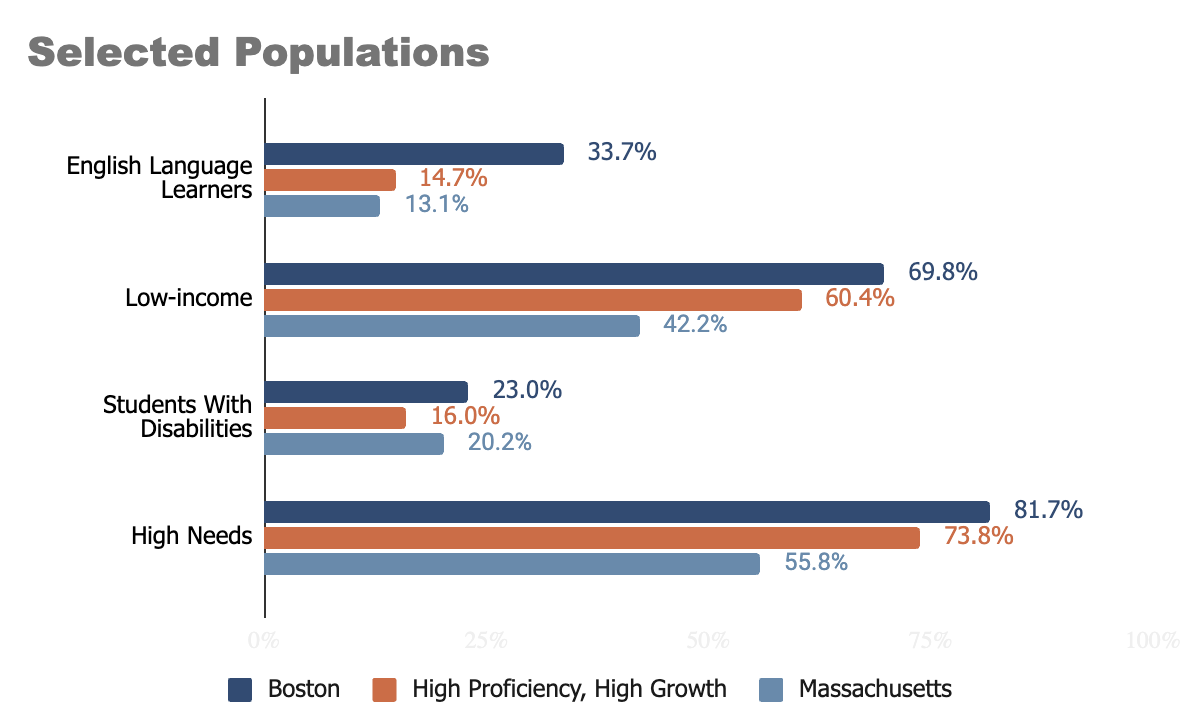FYI from BSF, 10.11.24
For every average or trend, there are exceptions.
Contrary to the grim assessments of the 2024 MCAS results, there is one group of schools that is pretty exceptional.
Results on the MCAS are typically reported in two well-known ways: proficiency (the percentage of students meeting or exceeding expectations) and student growth percentile (SGP), a complicated calculation which essentially expresses how much a student has improved.
Although there is a relationship between these two measures, their confluence is rare: there are very few schools with high proficiency and high growth. The higher one’s proficiency, there is, by definition, less room to grow. Further, SGP is calculated through a comparison to one’s peers; the more proficient students in your peer group, the harder it is to “outgrow” them.
You have to look closely, but amongst the 101 Boston Public Schools and Boston charter schools that administered the MCAS in grades 3-8, you can find the rare set of high proficiency, high growth schools.
Look top right, in ELA.
And in math.
These 11 schools not only beat state averages for proficiency, but also posted significant growth (+60). Three schools did so in both ELA and math:
Alighieri Dante Montessori School - ELA, Math
Bates Elementary School - ELA
Boston Collegiate Charter School - Math
Bradley Elementary - Math
Brooke Charter Schools - ELA, Math
Excel Academy Charter School - ELA
Hale Elementary - Math
O'Bryant - Math
Otis Elementary School - ELA
Perry Elementary - ELA, Math
Warren Prescott K-8 School - ELA
We have a tendency to qualify success in education. Many will look at this list and make mental asterisks - the size of the school, its location, its student body, etc.
But, when you combine these schools as a set, they don’t look all that different from Boston Public Schools.
Representing +7,300 students, these high proficiency, high growth schools educate more children than Cambridge, Brookline, or Plymouth. And they do so serving a mostly higher needs population than the majority of Massachusetts public schools.
These schools have done this while doing more. 8 of the 11 schools are BSF grantees, and each one of these schools has increased student enrollment and/or altered gradespans since 2015, not to mention managed a pandemic.
The limits in expanding high-dosage tutoring is a reminder of how difficult it is to scale a promising practice.
But that is no reason not to visit these 11 schools (and others), learn from their success, and try to do more of it.
Notes in the Margin
Boston School Committee met this week. Full materials here, including an MCAS presentation. I had a chance to share my thoughts on this week’s Last Night at School Committee podcast. If you are a School Committee super fan, why not apply? The nomination process is open for a potential seat in January, 2025, but keep in mind what you see going on in Florida, Providence and Chicago right now.
Promise there will be less MCAS to discuss soon, but probably not before November 5th. Yes on 2 got an endorsement from the Bay State Banner, an editorial in Schoolyard News, and support in Amherst. And proponents got a boost from a Suffolk poll showing their position in the lead.
The city of Cambridge and Mayor Wu will not be joining “Yes on 2.” On the ballot, some teachers say “yes” others say “no.”
The Boston Globe and Boston Herald endorsed “No on 2.” Secretary Pat Tutwiler was interviewed about MCAS and the importance of the graduation requirement, as was Board of Elementary and Secondary Education (BESE) member Matt Hills. A central concern is the potential to widen achievement gaps.
A recent BESE meeting is under scrutiny
Is more calculus a potential detente for the recent math wars?
One area of Massachusetts school enrollment that is growing: vocational education.
More research on how school grades are not adding up.
Attorney General Andrea Campbell is suing TikTok for its impact on young people’s mental health. I spoke with Representative Simon Cataldo, a fellow former teacher, about cell phone bans in schools.
PK-12 educational policy is not central to this year’s presidential race.
California has banned higher education legacy admissions. Massachusetts had a similar bill filed last session.
Correction: A graph in the 10.4.24 newsletter suffered from an unfortunate source error. It has been corrected on the web version and copied below. Thanks for the close readers that spotted it so I could fix it.






